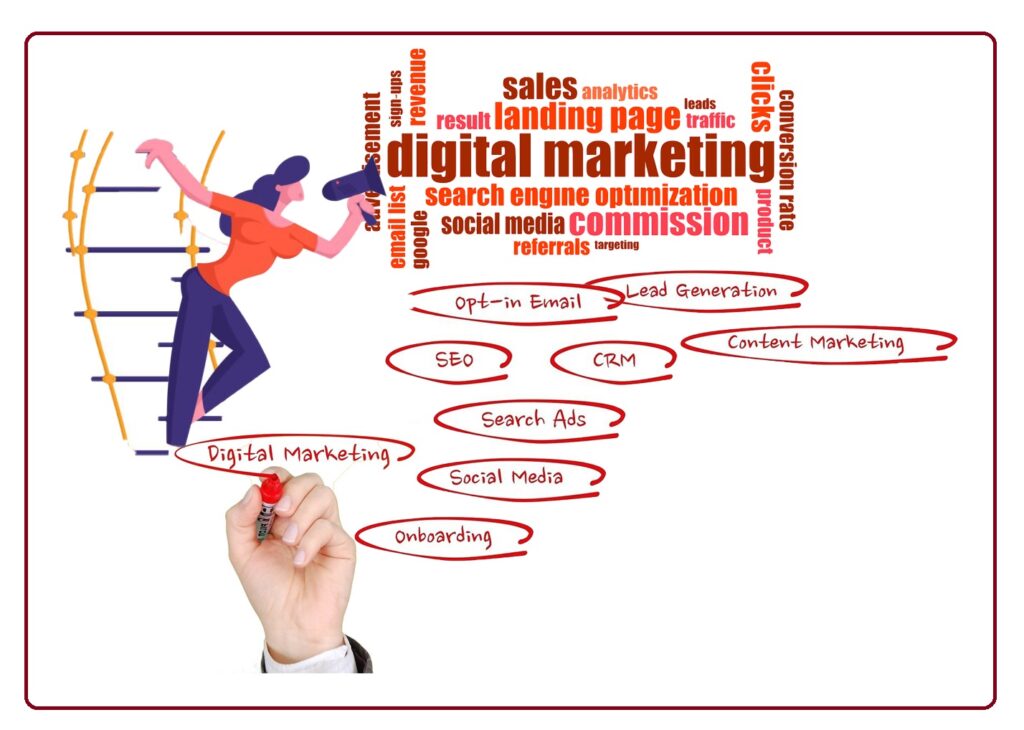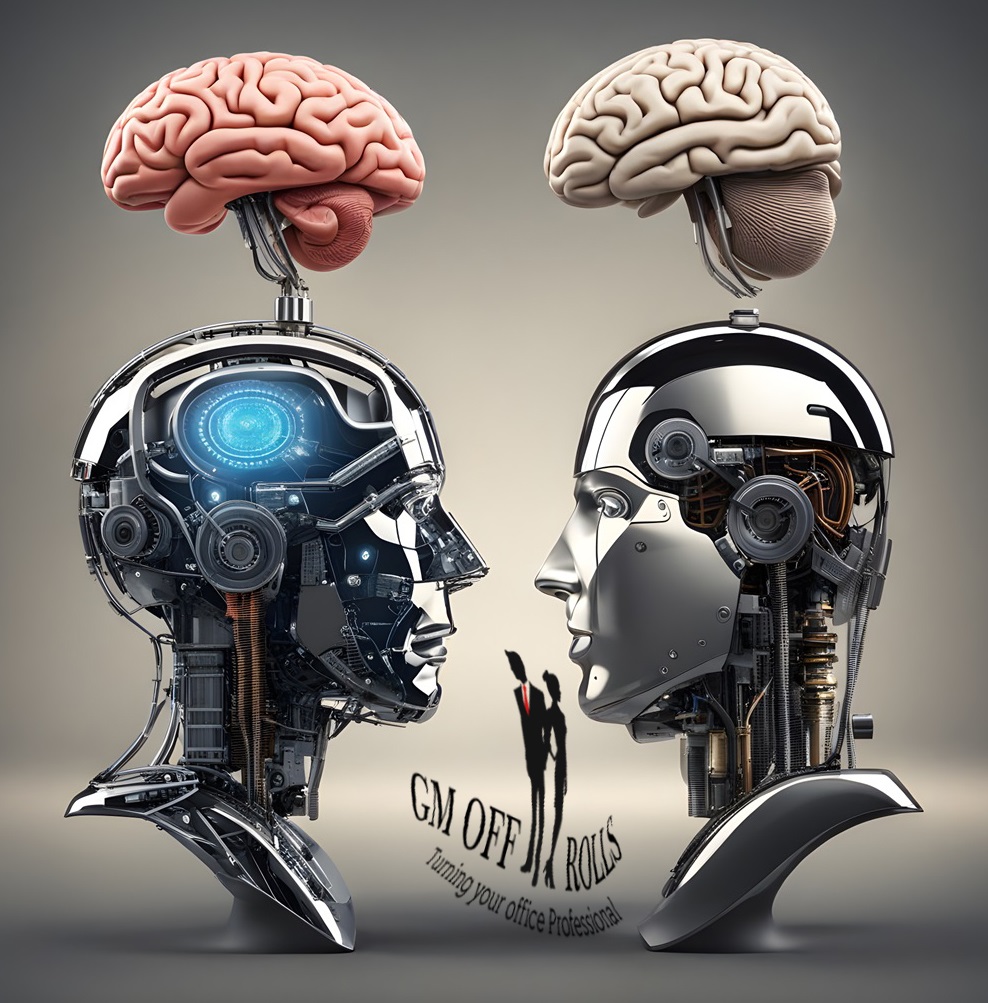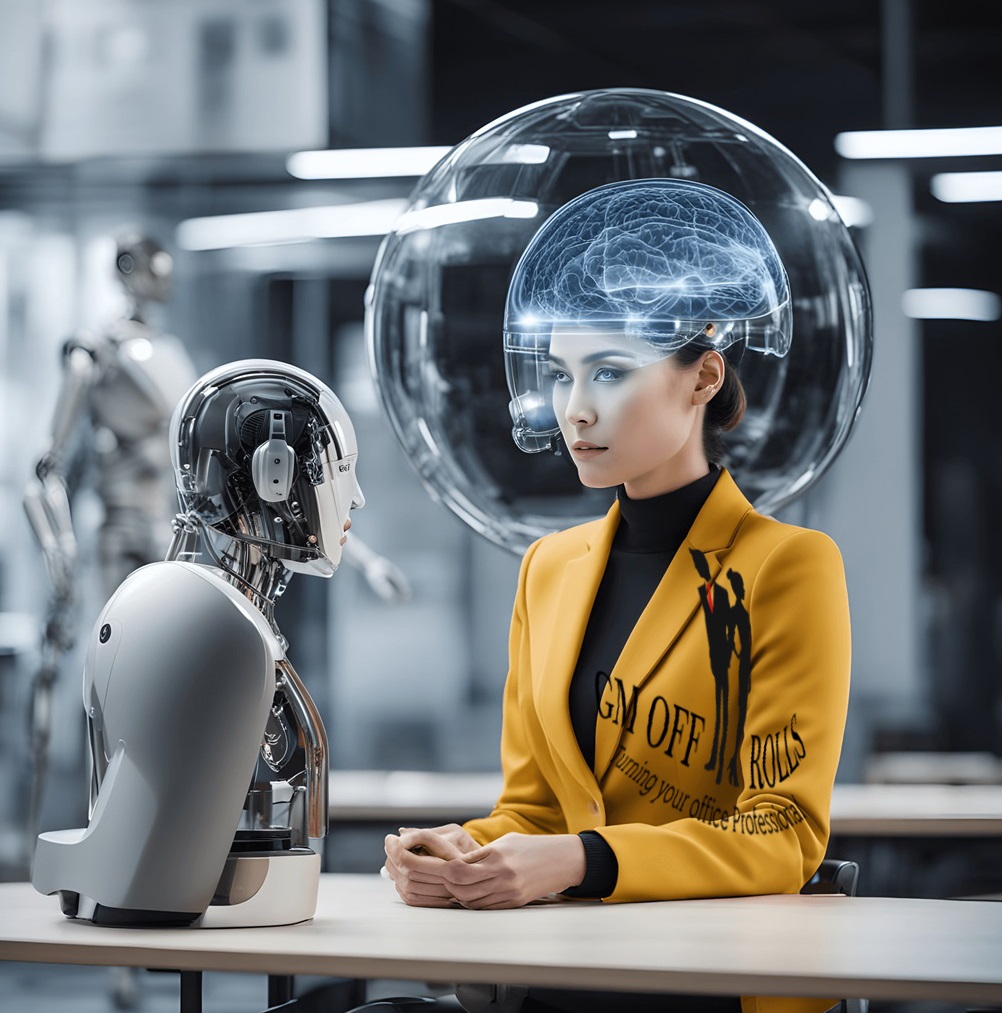Artificial Intelligence
The Power of Artificial Intelligence and Digital Marketing: A Comprehensive Guide to All Your Questions and Unveiling the Future Growth

Table of Contents
ToggleThe Power of Artificial Intelligence and Digital Marketing: A Comprehensive Guide to All Your Questions and Unveiling the Future Growth
Introduction:
In today’s digital era, Artificial Intelligence (AI) and Digital Marketing (DM) have become buzzwords that everyone is familiar with. However, despite this familiarity, many individuals still find themselves grappling with numerous questions and doubts surrounding these topics. If you are one of them, fear not! This blog aims to delve deep into the realms of AI and Digital Marketing, addressing all your queries and uncertainties.
From the fundamental “How” to the strategic “Why,” we will leave no stone unturned in providing you with insightful answers and clarifications. Whether you seek to understand the inner workings of AI, the intricacies of Digital Marketing techniques, or the symbiotic relationship between the two, this comprehensive guide has got you covered.
Furthermore, we will explore the future growth prospects of AI and Digital Marketing, shedding light on emerging trends, potential advancements, and the transformative impact they can have on businesses and industries. By the end of this blog, you will have a clear understanding of these dynamic fields, empowering you with knowledge to navigate the ever-evolving digital landscape confidently.
Join us on this enlightening journey as we demystify AI and Digital Marketing, equipping you with the insights you need to stay ahead in this rapidly changing digital world. Get ready to unlock the power of AI and harness the full potential of Digital Marketing!

What is AI or Artificial Intelligence?
AI stands for Artificial Intelligence. It is a branch of computer science that focuses on creating intelligent machines that can perform tasks that typically require human intelligence. AI involves the development of algorithms and models that enable computers to learn from data, reason, make decisions, and solve problems.
AI can be categorized into two types: Narrow AI and General AI. Narrow AI, also known as Weak AI, is designed to perform specific tasks within a limited domain, such as image recognition or language translation. General AI, also known as Strong AI or AGI (Artificial General Intelligence), refers to AI systems that possess human-level intelligence and can understand, learn, and apply knowledge across diverse domains.
AI techniques include machine learning, which involves training algorithms on large datasets to recognize patterns and make predictions; natural language processing, which enables machines to understand and interact with human language; computer vision, which allows machines to perceive and interpret visual information; and robotics, which combines AI with physical systems to perform tasks in the physical world.
AI has applications in various fields, including healthcare, finance, transportation, customer service, marketing, and more. It has the potential to revolutionize industries, enhance productivity, improve decision-making, and create new opportunities for innovation. However, it also raises ethical considerations around issues such as privacy, bias, and accountability.
Effects of AI or Artificial Intelligence?
The effects of AI are likely to be significant and far-reaching across many industries, including digital marketing. Here are some potential effects of AI:
- Increased efficiency: AI can help automate various tasks, allowing companies to save time and resources and improve efficiency.
- Improved personalization: AI can help companies personalize their marketing messages and offer to individual customers, improving customer engagement and satisfaction.
- Better decision-making: AI can help companies analyze data and make more informed decisions, leading to better business outcomes.
- New business models: AI can enable new business models and revenue streams, such as chatbots and voice assistants.
- Job displacement: While AI is likely to create new jobs in some areas, it may also lead to job displacement in others as machines take over tasks previously performed by humans.
- Ethical considerations: As AI becomes more advanced, it raises ethical considerations around issues such as privacy, bias, and accountability.
Overall, the effects of AI are likely to be significant and transformative across many industries, including digital marketing. Companies that embrace AI and use it effectively are likely to gain a competitive advantage and achieve better results over time.
What is Digital Marketing?
Digital marketing refers to the use of digital channels, such as search engines, social media, email, and websites, to promote products or services and engage with customers. It includes a wide range of tactics and strategies, such as search engine optimization (SEO), pay-per-click (PPC) advertising, social media marketing, content marketing, email marketing, and more.
Digital marketing has become increasingly important in the sales and marketing field, especially after the pandemic. However, it’s important to note that digital marketing requires expertise and knowledge to be effective. Simply watching a few YouTube videos or taking a course does not make one an expert in the field.

Companies that hire inexperienced or unqualified individuals to run their digital marketing campaigns run the risk of damaging their reputation and losing customers. It’s important to invest in qualified and experienced professionals who can develop and execute effective digital marketing strategies that align with the company’s goals and values.
Digital Marketing is not just creating pictures and updating FB and Instagram. It needs precise calculation, Continuous monitoring and testing and working knowledge of keywords and demographics to target specific customer natures. Effective digital marketing requires a deep understanding of the target audience, as well as expertise in various digital channels and marketing techniques. By leveraging digital marketing, companies can build brand awareness, generate leads, drive sales, and achieve their business goals in an increasingly digital world.

Benefits of Digital Marketing?
Digital marketing is important for several reasons:
- Wide reach: Digital marketing allows companies to reach a wider audience and target specific customer segments with personalized messaging and offers.
- Cost-effective: Compared to traditional marketing channels, digital marketing can be more cost-effective, allowing companies to achieve greater ROI on their marketing spend.
- Measurable results: Digital marketing provides measurable results, allowing companies to track the effectiveness of their campaigns and adjust their strategies accordingly.
- Real-time engagement: Digital marketing allows companies to engage with customers in real-time, responding to inquiries and feedback quickly and building stronger relationships.
- Competitive advantage: By leveraging digital marketing, companies can gain a competitive advantage over their competitors, reaching customers through multiple channels and touchpoints.
- Brand building: Digital marketing can be a powerful tool for building brand awareness, generating leads, and driving sales over time.
- Flexibility: Digital marketing allows companies to be more flexible in responding to changes in market demand and customer preferences, adjusting their strategies as needed to stay competitive.
Overall, digital marketing has become increasingly important in today’s digital world, providing companies with new opportunities to reach customers and achieve their business goals.
What are the effective methods for successful digital marketing?
What are the effective methods for successful digital marketing
There are several effective methods for successful digital marketing, including:
- Search Engine Optimization (SEO): Optimizing your website and content for search engines to improve your ranking in search and increase organic traffic.
- Pay-Per-Click (PPC) Placing ads on search engines and social media platforms to target specific keywords and demographics to drive traffic to a website.
- Social Media Marketing: Leveraging social media platforms to build brand awareness, engage with customers, and promote products or services.
- Content Marketing: Creating high-quality, content such as blog posts, videos, and infographics to attract and engage customers and build brand authority.
- Email Marketing: Using targeted email campaigns to promote products or services, nurture leads, and build customer loyalty.
- Influencer Marketing: Partnering with social media influencers to promote products or services and reach new audiences.
- Mobile Marketing: Optimizing your website and content for mobile devices to improve user experience and reach customers on-the-go.
- Video Marketing: Creating engaging video content to promote products or services and build brand awareness.
- Web Analytics: Using data and analytics tools to measure the effectiveness of your digital marketing efforts and adjust your strategy accordingly.
By leveraging these methods and developing a comprehensive digital marketing strategy that aligns with your business goals, companies can achieve success in the digital marketplace and drive growth and revenue over time.

Where does the human brain hold the upper hand when compared to Artificial Intelligence?
While AI has made significant advancements, the human brain still holds several advantages over AI. Here are a few areas where the human brain has an upper hand:
- Creativity and innovation: Humans possess the ability to think creatively, generate novel ideas, and innovate in ways that AI currently cannot match. The human brain can make connections between seemingly unrelated concepts, leading to breakthroughs and original solutions.
- Emotional intelligence: Humans have emotional intelligence, which includes the ability to understand, express, and manage emotions. This enables humans to empathize with others, build meaningful relationships, and make decisions based on intuition and emotional context.
- Complex problem-solving: Humans excel at solving complex problems that require critical thinking, reasoning, and judgment. The human brain can approach problems from multiple perspectives, adapt to new situations, and apply knowledge in creative ways.
- Common sense and contextual understanding: Humans possess common sense knowledge and have a deep understanding of the context in which they operate. This allows them to interpret ambiguous situations, make nuanced judgments, and navigate complex social interactions.
- Moral and ethical decision-making: Humans have a sense of morality and ethics that guides their decision-making. They can consider the ethical implications of their actions and make choices based on values and principles.
- Adaptability and learning: Humans have a remarkable ability to adapt to new environments, learn from experiences, and acquire new skills. The human brain can generalize knowledge across different domains and apply it in various contexts.
- Self-Sacrificing: Self-sacrificing for other’s good is something seen only in human beings and that too rarely.
While AI continues to advance, these uniquely human traits give us an upper hand in areas that require creativity, emotional intelligence, complex problem-solving, common sense reasoning, moral decision-making, adaptability, and learning. Harnessing these strengths alongside AI can lead to powerful outcomes in various domains.

Future of digital marketing with Artificial Intelligence
The future of digital marketing with Artificial Intelligence is very promising. AI (Artificial Intelligence) has already begun to transform the digital marketing landscape, and its impact is expected to grow significantly in the coming years. Here are some ways AI is likely to shape the future of digital marketing:
Personalization: Artificial Intelligence can help companies personalize their marketing messages and offers to individual customers, based on their preferences, behavior, and past interactions with the brand.
Predictive analytics: Artificial Intelligence can help companies analyze customer data and predict their future behavior, allowing them to tailor their marketing strategies and offers accordingly.
Chatbots: AI-powered chatbots can provide real-time customer service and support, answering customer inquiries and resolving issues quickly and efficiently.
Content creation: Artificial Intelligence can help companies create high-quality, personalized content at scale, using natural language processing and machine learning algorithms.
Voice search: With the rise of voice assistants like Alexa and Siri, AI-powered voice search is becoming increasingly important in digital marketing, requiring companies to optimize their content for voice search queries.
Marketing automation: Artificial Intelligence can help automate various aspects of digital marketing, such as email campaigns, social media posts, and ad targeting, allowing companies to save time and resources.
Fraud detection: AI can help detect and prevent fraud in digital marketing campaigns, such as click fraud and ad fraud.
Artificial Intelligence is expected to play a significant role in the future of digital marketing, helping companies improve customer engagement, increase efficiency, and achieve better results.

NEGATIVITY IN ARTIFICIAL INTELLIGENCE:
Artificial Intelligence (AI) has both – current and future implications, including potential negativity. Here are some aspects to consider:
Job Displacement from growth of Artificial Intelligence:
Job Displacement: AI automation can replace certain jobs, leading to unemployment or a shift in required skill sets. However, new jobs and opportunities may also emerge.
Bias and Discrimination:
Bias and Discrimination: AI systems can inherit biases from the data they are trained on, leading to discriminatory outcomes. Addressing bias in AI algorithms is crucial to ensure fairness and equity.
Privacy and Security from rise of Artificial Intelligence::
Privacy and Security: The increasing use of AI raises concerns about data privacy and security. Safeguarding personal information and preventing misuse of AI technologies are ongoing challenges.
Ethical Dilemmas on Artificial Intelligence::
Ethical Dilemmas: Artificial Intelligence: can raise ethical questions, such as the use of AI in warfare, autonomous vehicles making life-or-death decisions, or the potential for AI to manipulate opinions or behaviors.
Lack of Human Judgment:
Lack of Human Judgment: AI systems lack human intuition, empathy, and moral reasoning. Relying solely on AI decision-making without human oversight can lead to unintended consequences.
Dependence and Unemployment:
Dependence and Unemployment: Over-reliance on AI systems without proper human oversight or backup plans can make society vulnerable if these systems fail or malfunction.
Future Unknowns:
Future Unknowns: As AI continues to advance rapidly, there may be unforeseen challenges and risks that emerge, requiring ongoing monitoring and regulation.
It’s important to address these concerns proactively through ethical guidelines, transparency, and responsible deployment of AI technologies to maximize the benefits while minimizing potential negativity.
CONCLUSION:
Artificial Intelligence is here to stay. Artificial Intelligence will get better and better with more experience like a child growing.
However, the child will have limited knowledge whereas the AI will have unlimited knowledge, raw data, and the ability to process it.
That is what worries everyone most. Are we creating our TERMINATOR OF THE FUTURE – TODAY??


